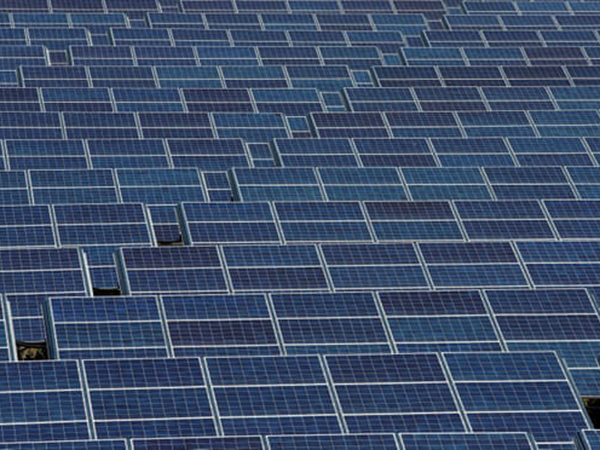Legislation approved by Senate will apply to existing and new car parks with space for at least 80 vehicles
Solar panels at the Urbasolar photovoltaic park in Gardanne. French politicians are also examining proposals to build large solar farms on empty land by motorways and railways as well as on farmland. Photograph: Jean-Paul Pélissier/Reuters
All large car parks in France will be covered by solar panels under new legislation approved as part of president Emmanuel Macron’s renewable energy drive.
Legislation approved by the French Senate this week requires existing and new car parks with space for at least 80 vehicles to be covered by solar panels.
The owners of car parks with between 80 and 400 spaces have five years to comply with the measures, while operators of those with more than 400 will have just three years. At least half of the area of the larger sites must be covered by solar panels.
The French government believes the measure could generate up to 11 gigawatts of power.
Politicians had originally applied the bill to car parks larger than 2,500 sq metres before deciding to opt for car parking spaces.
French politicians are also examining proposals to build large solar farms on empty land by motorways and railways as well as on farmland.
The former UK prime minister Liz Truss considered blocking solar farms being built on agricultural land.
The sight of parked cars under the shade of solar panels is not unfamiliar in France. Renewables Infrastructure Group, one of the UK’s largest specialist green energy investors, has invested in a large solar car park in Borgo on Corsica.
Macron has thrown his weight behind nuclear energy over the past year and in September announced plans to boost France’s renewable energy industry. He visited the country’s first offshore windfarm off the port of Saint-Nazaire off the west coast and hopes to speed up the build times of windfarms and solar parks.
The move comes as European nations examine their domestic energy supplies in the fallout from Russia’s invasion of Ukraine.
Technical problems and maintenance on the powerhouse French nuclear fleet has exacerbated the problem while the national operator EDF was forced to cut its output in the summer when French rivers became too warm.
The government has also launched a communication campaign, “Every gesture counts”, encouraging individuals and industry to cut their energy usage, and the Eiffel Tower lights are being turned off more than an hour earlier.
The French government plans to spend €45bn shielding households and businesses from energy price shocks.
Separately on Wednesday, ScottishPower announced it would increase its five-year investment target by £400m to £10.4bn by 2025. The UK solar and windfarm developer hopes to generate 1,000 jobs in the next 12 months.
There can be no more hiding, and no more denying. Global heating is supercharging extreme weather at an astonishing speed. Guardian analysis recently revealed how human-caused climate breakdown is accelerating the toll of extreme weather across the planet. People across the world are losing their lives and livelihoods due to more deadly and more frequent heatwaves, floods, wildfires and droughts triggered by the climate crisis.
At the Guardian, we will not stop giving this life-altering issue the urgency and attention it demands. We have a huge global team of climate writers around the world and have recently appointed an extreme weather correspondent.
Our editorial independence means we are free to write and publish journalism which prioritises the crisis. We can highlight the climate policy successes and failings of those who lead us in these challenging times. We have no shareholders and no billionaire owner, just the determination and passion to deliver high-impact global reporting, free from commercial or political influence.
And we provide all this for free, for everyone to read. We do this because we believe in information equality. Greater numbers of people can keep track of the global events shaping our world, understand their impact on people and communities, and become inspired to take meaningful action. Millions can benefit from open access to quality, truthful news, regardless of their ability to pay for it.
Post time: Nov-11-2022

